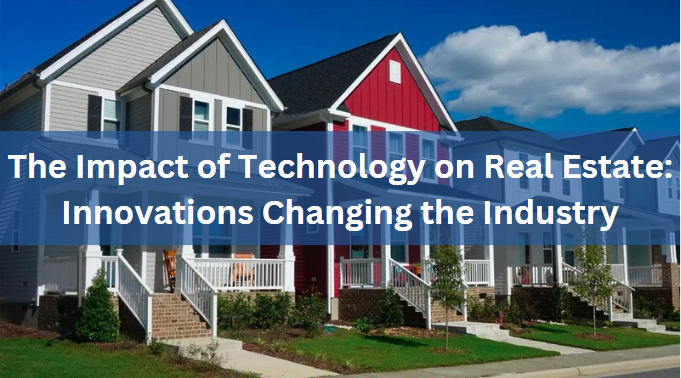Technology is revolutionizing the real estate industry, bringing about significant changes in how properties are bought, sold, and managed. From virtual tours to blockchain transactions, technological advancements are enhancing efficiency, transparency, and customer experiences. This article explores the key innovations transforming the real estate landscape and their impact on the industry.
Contents [hide]
1. Virtual and Augmented Reality
Virtual Reality (VR) Tours
Virtual reality (VR) allows potential buyers to tour properties remotely. With VR headsets, users can explore homes in a 360-degree environment, providing a realistic sense of the space without physically being there.
- Benefits:
- Convenience: Buyers can view multiple properties from the comfort of their homes.
- Global Reach: International buyers can explore properties without traveling.
- Time-Saving: Reduces the need for in-person visits to unsuitable properties.
Augmented Reality (AR) Applications
Augmented reality (AR) enhances the viewing experience by overlaying digital information onto the real world. Prospective buyers can use AR apps to visualize how furniture and decor will look in a space, aiding in decision-making.
- Benefits:
- Personalization: Helps buyers see the potential of a property tailored to their preferences.
- Engagement: Increases engagement and interest in listings.
2. Artificial Intelligence (AI) and Machine Learning
Predictive Analytics
AI and machine learning are used to analyze vast amounts of data to predict market trends, property values, and investment opportunities. These technologies help real estate professionals make informed decisions and offer personalized recommendations to clients.
- Benefits:
- Market Insights: Provides accurate predictions of market movements.
- Targeted Marketing: Enables personalized marketing strategies based on buyer behavior and preferences.
Chatbots and Virtual Assistants
AI-powered chatbots and virtual assistants streamline customer service by answering queries, scheduling viewings, and providing property information 24/7.
- Benefits:
- Availability: Offers round-the-clock customer support.
- Efficiency: Frees up human agents to focus on more complex tasks.
3. Blockchain Technology
Secure Transactions
Blockchain technology ensures secure and transparent real estate transactions by providing a tamper-proof digital ledger. This reduces fraud and increases trust between buyers and sellers.
- Benefits:
- Transparency: Ensures all transaction details are recorded and immutable.
- Security: Reduces the risk of fraud and ensures the integrity of data.
Smart Contracts
Smart contracts, powered by blockchain, automate and enforce the terms of agreements without the need for intermediaries. This streamlines the closing process and reduces administrative costs.
- Benefits:
- Efficiency: Automates contract execution and reduces paperwork.
- Cost-Effective: Lowers transaction costs by eliminating intermediaries.
4. Internet of Things (IoT)
Smart Homes
The Internet of Things (IoT) connects devices and systems within a home, allowing for remote monitoring and control. Smart home technologies include automated lighting, security systems, thermostats, and appliances.
- Benefits:
- Convenience: Allows homeowners to control home systems from their smartphones.
- Energy Efficiency: Optimizes energy use, reducing utility costs.
- Security: Enhances home security with real-time monitoring and alerts.
Property Management
IoT devices are used in property management to monitor building systems, detect maintenance issues, and ensure energy efficiency. This technology helps property managers maintain buildings proactively and reduce operational costs.
- Benefits:
- Preventative Maintenance: Identifies issues before they become major problems.
- Operational Efficiency: Streamlines building management and reduces costs.
5. Big Data and Analytics
Market Analysis
Big data analytics processes vast amounts of information from various sources to provide insights into market trends, property values, and buyer behavior. Real estate professionals use these insights to make data-driven decisions.
- Benefits:
- Comprehensive Insights: Offers a holistic view of market dynamics.
- Informed Decisions: Helps professionals and investors make strategic choices.
Customer Insights
By analyzing customer data, real estate companies can better understand buyer preferences and behavior. This allows for more targeted marketing and improved customer service.
- Benefits:
- Personalized Marketing: Tailors marketing efforts to individual buyer preferences.
- Enhanced Experience: Improves customer satisfaction and engagement.
6. Mobile Applications
Property Search and Listings
Mobile apps have revolutionized property search by providing users with access to listings, photos, and virtual tours on their smartphones. Apps like Zillow, Realtor.com, and Redfin offer user-friendly interfaces for property hunting.
- Benefits:
- Accessibility: Makes property search convenient and accessible from anywhere.
- User Engagement: Increases engagement with interactive features like maps and filters.
Transaction Management
Mobile apps streamline the transaction process by allowing buyers and sellers to manage documents, communicate with agents, and track the progress of deals from their phones.
- Benefits:
- Convenience: Simplifies the transaction process for all parties involved.
- Transparency: Provides real-time updates and document access.
7. Drones
Aerial Photography and Videography
Drones are used to capture high-quality aerial images and videos of properties, providing unique perspectives that enhance listings and marketing materials.
- Benefits:
- Visual Appeal: Creates stunning visuals that attract potential buyers.
- Comprehensive Views: Offers a complete view of the property and surrounding area.
Property Inspections
Drones are also used for property inspections, especially for large or difficult-to-access areas. They can identify issues such as roof damage, structural problems, and land surveys.
- Benefits:
- Safety: Reduces the need for manual inspections in hazardous areas.
- Efficiency: Speeds up the inspection process and provides detailed reports.
8. Online Marketplaces and Platforms
Real Estate Portals
Online marketplaces like Zillow, Redfin, and Realtor.com have transformed how properties are listed and searched. These platforms offer extensive databases of listings, complete with photos, descriptions, and market data.
- Benefits:
- Broad Reach: Expands the reach of listings to a global audience.
- Detailed Information: Provides comprehensive property information and market analysis.
Rental Platforms
Platforms like Airbnb and Vrbo have disrupted the rental market by allowing homeowners to rent out their properties short-term. These platforms offer flexibility and additional income streams for property owners.
- Benefits:
- Income Potential: Enables property owners to earn income from short-term rentals.
- Flexibility: Offers flexible rental terms for both owners and renters.
Conclusion
The impact of technology on real estate is profound and far-reaching. Innovations such as virtual and augmented reality, AI, blockchain, IoT, big data, mobile apps, drones, and online platforms are transforming how properties are bought, sold, and managed. These technologies enhance efficiency, transparency, and customer experiences, making the real estate process more seamless and accessible.
As technology continues to evolve, it will undoubtedly bring further advancements and opportunities to the real estate industry, shaping its future in ways we can only begin to imagine.




